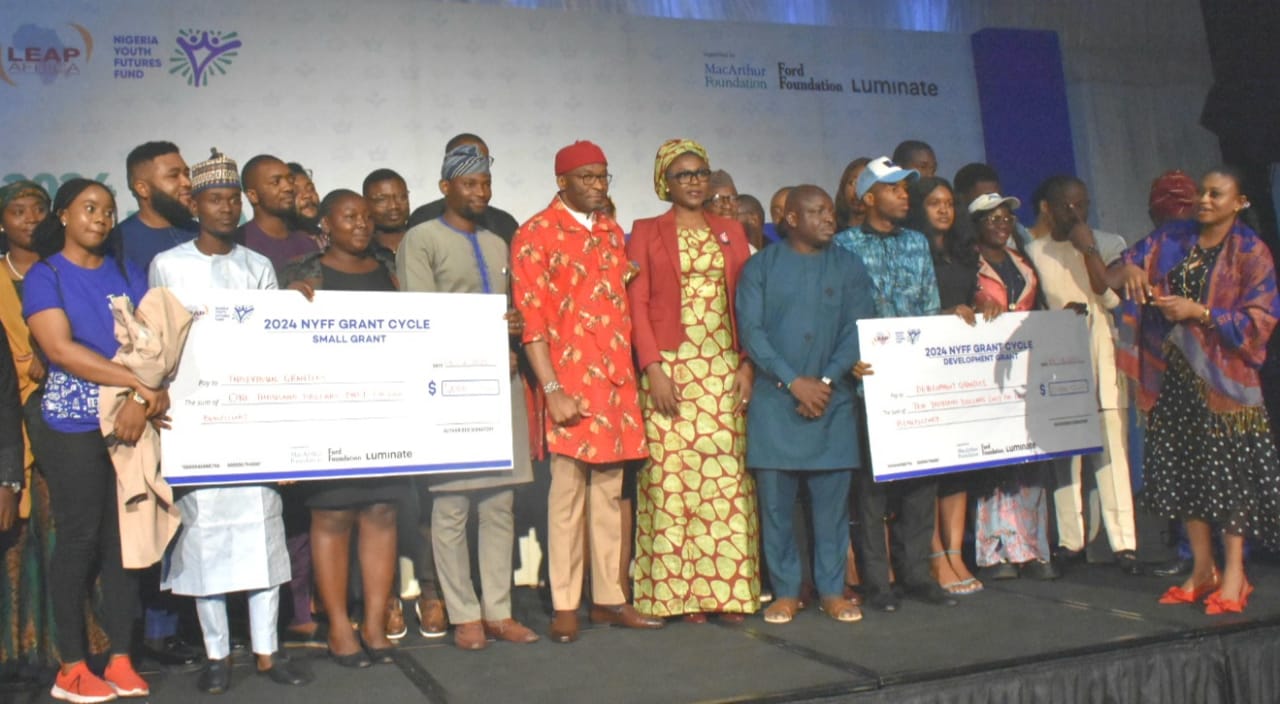News
2024 NYFF Grant Unveiling, Beckons Of Hope For Nigerians Youth-Minister

Joel Ajayi
The Minister of Youth Development Dr. Jamila Bio Ibrahim has expressed that the launching of the 2023/24 Nigeria Youth Futures Fund NYFF remains an inspiration for Nigerian youth for a Prosperous Future.
In her keynote address at the official 2024 2024 NYFF Grant Cycle Unveiling on Monday in Abuja, Minister Dr. Ibrahim said the youth are the architects of the nation and there is a need to invest them for prosperity.

NYFF fund grant, which is a collaborative effort spearheaded by LEAP Africa and funded by the MacArthur Foundation, the Ford Foundation, and the Luminate Group, where $1.2 million was given to 160 organizations and individuals.
Minister said this announcement represents a significant increase from the previous year’s disbursement of $600,000 to 130 recipients, demonstrating the growing commitment of the stakeholders to youth empowerment.

According to her, Today marks the unveiling of the Nigerian Youth Futures Fund, a visionary and collaborative effort spearheaded by LEAP Africa and generously funded by the MacArthur Foundation, the Ford Foundation, and the Luminate Group.
This initiative seamlessly aligns with the core pillars of the Ministry of Youth: Education, Empowerment, and Engagement. It synergizes with existing initiatives such as the Youth Development Bank, the initiative to equip youth with knowledge and skills in critical sectors, and the creation of youth-centric platforms to project the voice of the Nigerian youth.
“Through collaborative efforts, we invest in educational opportunities beyond classrooms learning by doing, experiencing, and leading. We empower our youth with the resources to turn dreams into reality, fostering entrepreneurship, innovation, and sustainable development.

Dr. Ibrahim asserted that the increased funding symbolizes more than just numerical expansion.
“This is a bold move to catalyze a wave of change, encouraging our young citizens to play active roles in shaping the Nigeria we envision,” she said.
The Minister added that this fund serves to bridge the gap between the ambitions of Nigerian youth and the resources needed to make them a reality.
She noted, “We believe in your power to innovate, lead, and drive the progress we all aspire to witness.”
“For us, the NYFF’s significance goes beyond financial support; it is about igniting a national conversation and inspiring collective action toward achieving a future where all Nigerians can thrive. The fund covers key sectors such as good governance, sustainable development & infrastructure and addresses fundamental questions of unity, empathy, and patriotism.
“This fund is not just a financial commitment; it’s a resounding vote of confidence in the leadership capabilities of our youth. It is rooted in the belief that by empowering our youth with the right resources and opportunities, we are shaping the architects of our nation’s medium and long-term developmental plans.”
She urged all beneficiaries of the 2024 Grant Cycle of the Nigeria Youth Futures Fund(NYFF) to maximize the 1.6 million dollars for national development.
In her remark, Deputy Director, of LEAP Africa Kehinde Ayeni, explained that the NYFF is a collaborative initiative aimed at strengthening youth leadership in Nigeria.
She emphasized the fund’s long-term goal.
“The Nigeria Youth Futures Fund (NYFF) is a five-year collaborative initiative implemented by LEAP Africa and funded by MacArthur Foundation, and Ford Foundation to strengthen youth leadership in Nigeria.
“For the first year, we saw a lot of progress and growth and aspirations of young Nigerians, who responded to the fund and its purpose.
“Now, we are unveiling two categories out of three, which are the development and individual plan.
“We are giving out 1.2 million dollars over the next 12 months to almost 200 organizations or individuals.”
News
Senate Confirms NCC Board, charged to Consolidate Reforms and Expand Digital space

The newly confirmed Board of the Nigerian Communications Commission (NCC) have being urged to provide bold, transparent, and accountable leadership that will consolidate ongoing reforms in Nigeria’s telecommunications sector and expand digital access to every part of the country.
Sources revealed what the President will expect of them following the Senate’s confirmation.
Chief Idris Ibikunle Olorunnimbe as Chairman of the Board of the NCC, along with other distinguished members:
• Senator Ramoil Olalekan Mustafa, CON
• Engr. Ikechukwu Ugwuegede
• Princess Oristserenwe Emiko
• Barr. Christopher Sandy Okorie
• Hajiya Maryam Bayi
The new Board brings together experienced professionals and reform-minded leaders at a critical time in the evolution of Nigeria’s digital economy.
Chief Olorunnimbe is part of a new generation of leaders whose blend of innovation, entrepreneurship, and public service reflects the administration’s vision of a knowledge-driven, inclusive, and globally competitive economy.
NCC Board is expected to focus on strengthening regulatory independence, improving consumer protection, and accelerating broadband expansion, while ensuring that Nigeria remains a secure, attractive, and competitive destination for digital investment.
Board to work is expected to work in close coordination with the Executive Vice Chairman and Chief Executive Officer of the NCC, and the Honourable Minister of Communications, Innovation and Digital Economy, in advancing the goals and accelerate delivery on the Renewed Hope Agenda for a digitally inclusive, knowledge-driven economy.
-

 Featured6 years ago
Featured6 years agoLampard Names New Chelsea Manager
-

 Featured6 years ago
Featured6 years agoFG To Extends Lockdown In FCT, Lagos Ogun states For 7days
-

 Featured6 years ago
Featured6 years agoChildren Custody: Court Adjourns Mike Ezuruonye, Wife’s Case To April 7
-

 Featured6 years ago
Featured6 years agoNYSC Dismisses Report Of DG’s Plan To Islamize Benue Orientation Camp
-

 Featured4 years ago
Featured4 years agoTransfer Saga: How Mikel Obi Refused to compensate me After I Linked Him Worth $4m Deal In Kuwait SC – Okafor
-
Sports3 years ago
TINUBU LAMBAST DELE MOMODU
-

 News10 months ago
News10 months agoZulu to Super Eagles B team, President Tinubu is happy with you
-
Featured6 years ago
Board urges FG to establish one-stop rehabilitation centres in 6 geopolitical zones
